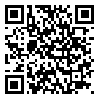BibTeX | RIS | EndNote | Medlars | ProCite | Reference Manager | RefWorks
Send citation to:
URL: http://payeshjournal.ir/article-1-600-en.html
Payesh
2009; 8: 379-385
Accepted: 29 Jun 2007
[EPub a head of print-29 August 2009]
Objective(s): To investigate pre-marriage educational needs of couples to plan support services.
Methods: In a cross-sectional study, a self administered questionnaire was used to collect data from 2117 participants in pre-marriage consulling sessions in Isfahan city. The questionnaire included educational needs in different subjects of reproductive health field, spousal relationships and Islamic rules and rights. The educational priorities in different fields are as fallows: women cancers and safe sex in reproductive health, communication techniques and ways to solve problems with the spouse in the spousal relationships and legal rights related to sex and the advices of Islam about spousal relationships in the field of Islamic rules and rights respectively.
Results: The average age of women and men were 22.8 ± 4.2 years, 26.2± 4.3, respectively. Significant association was observed in the field of reproductive health between the educational needs and women's job (P=0.022), men's job (P=0.009), women's age (P=0.033) and the level of education (P=0.001), in the field of spousal relationships between the educational needs and women's job (P<0.001), men's job (P=0.043), age of both women and men (P=0.001), and in the Islamic rules and rights field, between the educational needs and women's job (P<0.001), age of both women and men (P=0.044) and the level of education (P=0.007).
Conclusion: In men with higher educational level, demands for learning increase however in women it reduce. By increasing the age, needs for education in both sexes reduce. Employed women had lower needs for education compared to other groups and employed men had more needs. There was no significant difference between rural and urban residents.
Accepted: 2018/11/28 | Published: 2009/10/15
| Rights and Permissions | |
 |
This work is licensed under a Creative Commons Attribution-NonCommercial 4.0 International License. |





